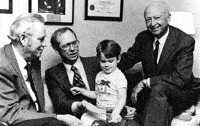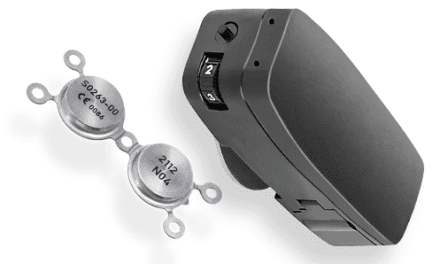July 30, 2007
DURHAM, NC — MED-EL Corporation has announced the U.S. Food and Drug Administration (FDA) approval of the SONATA TI100 cochlear implant.
“The SONATA TI100 offers cochlear implant candidates and their surgeons a new choice in housing as they evaluate implant options,” said Kim Jackson, vice president of clinical services. “The smaller incision required for this implant translates to a smaller surgical site —a key consideration for cochlear implant candidates, particularly children, and an alternate surgical approach for surgeons.” More than 1,150 hearing care professionals heard about the SONATATI100, which was approved last year for the EU and other non-US markets, during the biennial International Conference on Cochlear Implants in Charlotte, NC, in April.
Both MED-EL’s SONATA TI100 and PULSAR CI100 cochlear implants reportedly combine the smallest, thinnest, and lightest-weight implant available with MED-EL’s powerful next generation I100 electronics. This technology is essential for the company’s advanced research and developments in the areas of music enjoyment and speech understanding in difficult listening situations. The implants are also said to be “future-ready,” designed to implement future upgrades and enhancements.
Available features include:
- Sophisticated I100 electronics for sound clarity and detail;
- Sequential stimulation and biphasic pulses;
- Impedance and Field Telemetry, and
- A choice of electrode options to address specific medical situations
Features under development include:
- Fast stimulation rates of up to 50,700 pulses per second;
- Parallel stimulation and triphasic pulses;
- Safety features, including a unique implant ID, and
- Status Telemetry and Auditory Nerve Response Telemetry
The electronic components of MED-EL’s cochlear implants are arranged on a single custom-designed ASIC (Application Specific Integrated Circuit) microchip. The microchip allows more information to be processed, while maintaining low energy requirements. MED-EL’s power-efficient technology reportedly makes it possible to provide recipients the benefits of high-rate stimulation with the comfort of a behind-the-ear (BTE) speech processor. This energy efficiency translates into long battery life, typically three to five days of use per set of batteries.
Additionally, the SONATA TI100 and PULSAR CI100 have 24 independent current sources for highly precise, high-rate stimulation over the entire length of the cochlea. Research has shown that an optimal rate causes the auditory nerve to behave as in the normal hearing process. MED-EL’s cochlear implants are designed to mimic this process (stochastic behavior) by stimulating at rates matching the abilities of the recipient’s auditory nerve.
For more information, click here.
SOURCE: MED-EL




